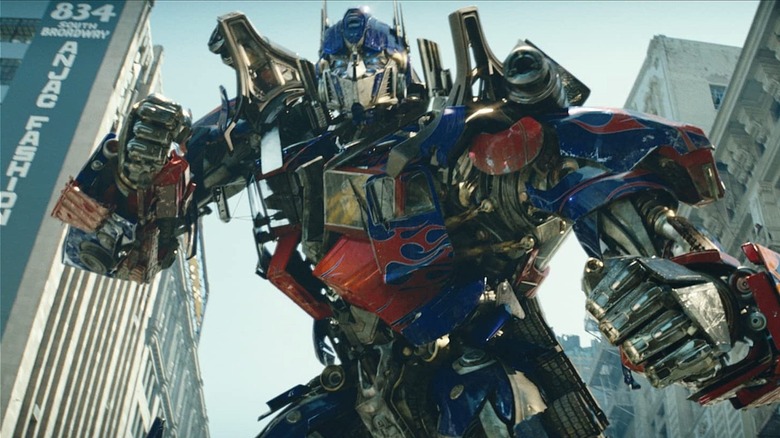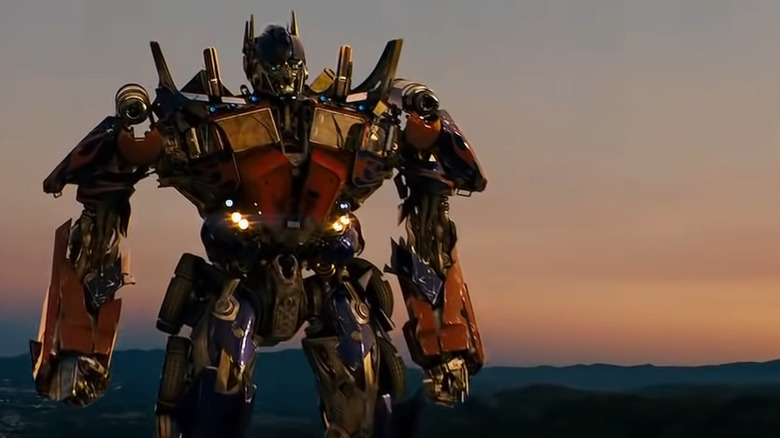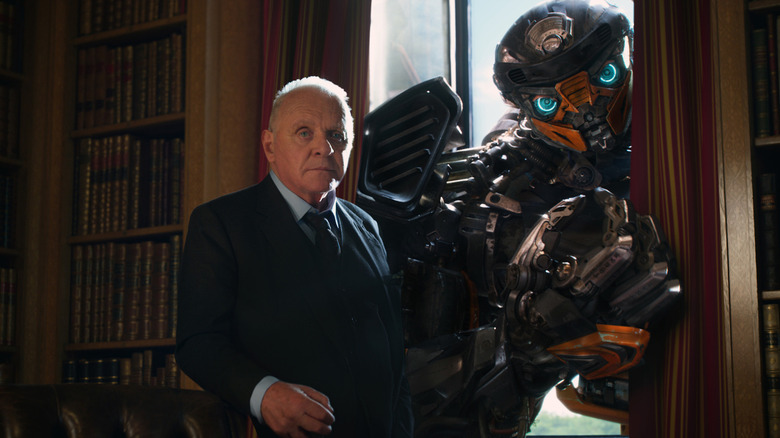Why Michael Bay's Immediate Response To Transformers Was A Big Fat No
Michael Bay was a decade into his film directing career when Steven Spielberg and "Transformers" beckoned. He'd established himself as a maestro of mayhem — or, as we call it now, "Bayhem." He made the $19 million budgeted "Bad Boys" look like a $75 million action extravaganza, and the $75 million budgeted "The Rock" look like one of the most expensive action movies ever made. Had Bay arrived on the scene in the 1980s, he would've been making high-style, ultra-violent shoot-em-ups with Sylvester Stallone and Arnold Schwarzenegger.
Unfortunately, at the turn of the millennium, four-quadrant tentpole blockbusters were all the rage, which meant Bay had to stifle his R-rated urges and deliver PG-13 spectacle for maximum worldwide grosses. He delivered with "Armageddon," and, to a lesser degree, the distressingly bloodless "Pearl Harbor," which gave him carte blanche to make one of the most morally reprehensible (yet spectacularly entertaining) studio action movies of all time in "Bad Boys II." When that R-rated film grossed almost $200 million less than "Pearl Harbor," he had to rein it back in.
He did so with "The Island," a summer sci-fi tentpole that fell well short of box-office expectations. It was Bay's first commercial stumble, but one he could easily weather given his commercial track record. Still, if he wanted to make his dream pitch-black comedy about the murderous Miami weightlifters he kept talking about at press conferences, he need to consider making a can't-miss project.
It was at this point that Spielberg hit him up about directing "Transformers," and Bay, initially, wanted no part of it.
It sounds like a toy movie
In a 2007 interview with Entertainment Weekly's Adam B. Vary, Bay revealed that he did not spark to Spielberg's pitch. "The story is true," he said. "I hung up [after we talked] and went 'I'm not doing that silly movie because it sounds like a toy movie.'" But Bay decided to visit Hasbro headquarters and sit for what the company calls "Transformer School," where they give interested directors a crash course in the toy franchise's lore (Mattel did the same thing with Greta Gerwig to woo her for "Barbie").
Bay's resistance gradually subsided. As he told Vary:
"I like Japanese anime movies — I just think visually they're really cool. There were some images in the room; I kept looking at one and I'm like, you know, if I make it real and edgy, it might be something really interesting. So I was a non-Transformer fan, but that's good because I think it makes it more accessible for people that are non-Transformer fans. I kept having this image of a kid hiding his robots from his parents. To me, that's just a great kid fantasy. You have alien robots that are your friends. That's charming to me."
Of Optimus Prime and artistic freedom
I am ambivalent about Bay's five-film "Transformers" run. "Transformers: Dark of the Moon" is the best of the calamitous bunch, but these films have a mean-spirited streak coursing through their motor-oil veins. Still, Bay directed nearly a half-dozen of these suckers, so he must've warmed to the characters and their universe on some level. Or he just liked the money.
Bay finally got to make his misanthropic crime caper "Pain & Gain" in-between "Transformers" movies, and, on a thematic level, it's the best thing he's ever done (Dwayne "The Rock" Johnson is downright revelatory). Now that he's out of the robots-in-disguise business (as a director at least), he's turned into a bit of a softie. "6 Underground" is a mega-budget blast that would've been better served with a theatrical release than a pre-pandemic dump to Netflix, while "Ambulance" brought him back to his R-rated wheelhouse minus the cruelty. It's a genuinely humanistic work! If he had to slug it out through five terminally stupid movies about space robots to get there, it was worth it. All hail the evolving sensibility of Michael Bay.


